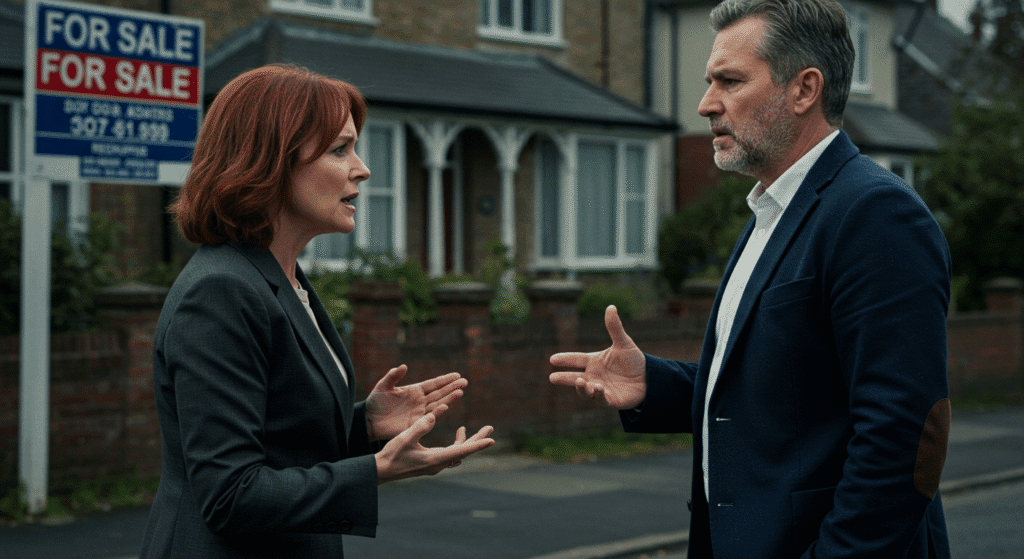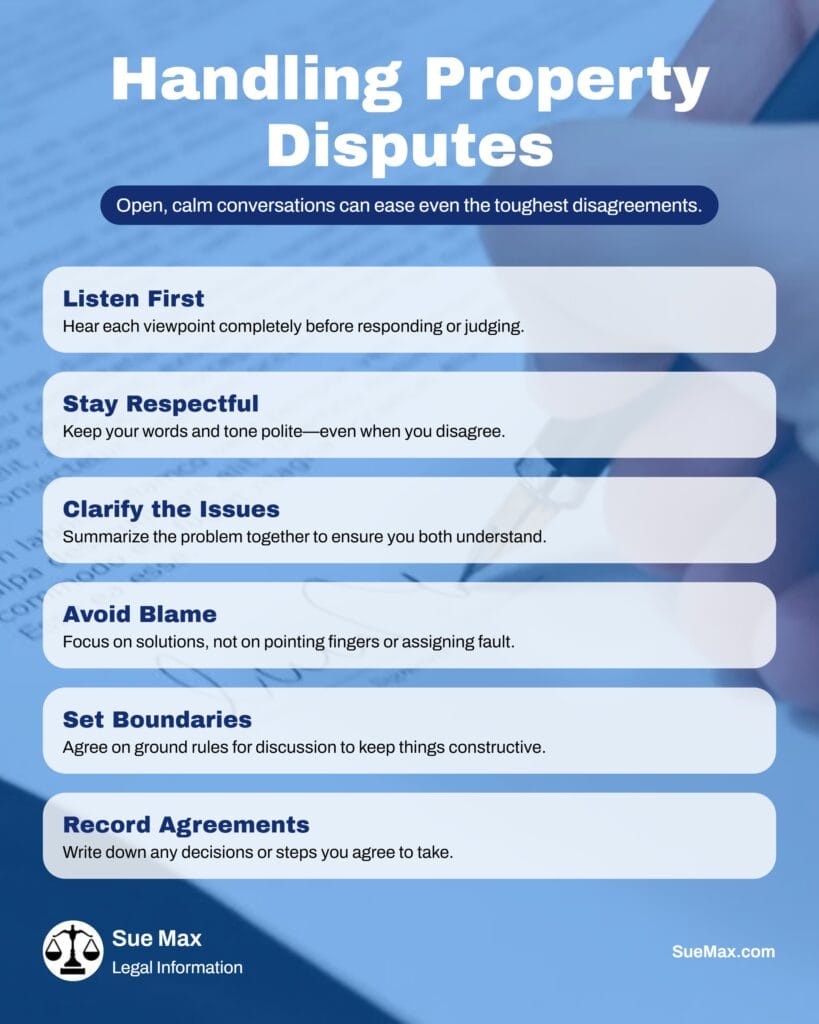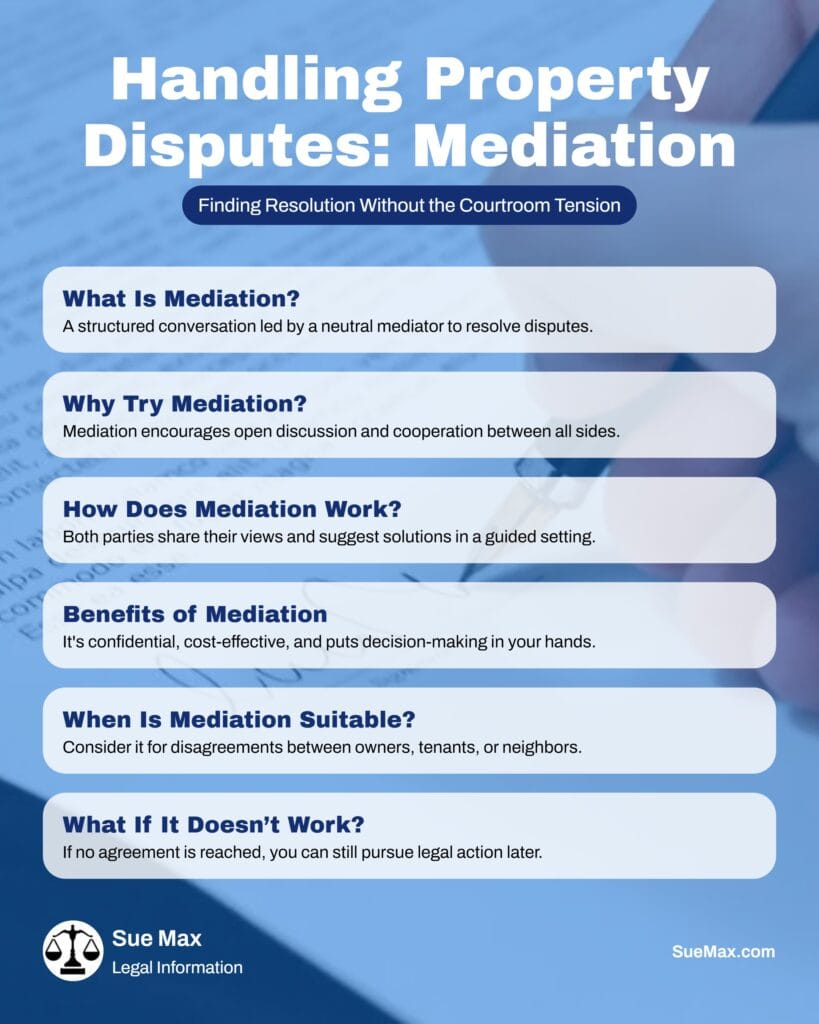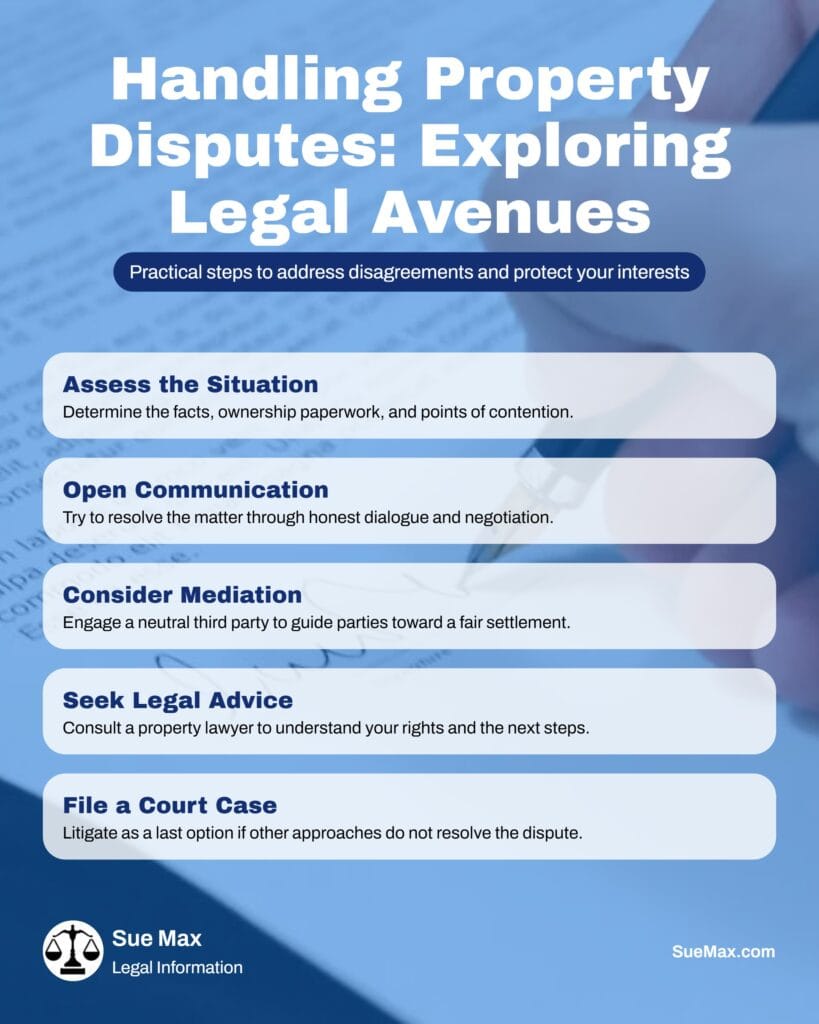It can be hard to deal with property conflicts, like attempting to unravel a huge ball of yarn. It’s frustrating, takes a long time, and sometimes leaves you with unanticipated scratches. These conflicts may rapidly get out of hand if they aren’t handled correctly, whether it’s about who gets the garden shed or who has dibs on the parking place. So, how can we stay calm and work things out without getting a referee involved? Let’s look at some best practices that will help you handle property conflicts well.
Top Takeaways and Key Concepts
Learn your local property laws and review all contracts to avoid misunderstandings before disputes arise.
Communicate calmly and use active listening to find common ground instead of escalating conflict.
Consider mediation as a cost-effective, neutral way to resolve disagreements without going to court.
Keep detailed records of communications, agreements, and evidence to protect yourself legally.
Know when to walk away from disputes that damage relationships or waste time and energy.
Summary of This Article
This article offers a humorous yet practical guide to resolving property disputes with patience, clarity, and cooperation. It emphasizes the importance of understanding your rights and responsibilities, reading contracts carefully, and knowing local laws before taking any action. The author highlights open, respectful communication as a cornerstone of peaceful resolution and suggests using mediation to find fair, creative compromises without court drama. Maintaining clear documentation of every discussion and agreement helps prevent confusion and protect your position if legal steps become necessary. Finally, the article encourages readers to prioritize peace over pride, reminding them that sometimes walking away gracefully preserves relationships and sanity better than winning a fight over a fence or parking space.
Understand Your Rights and Responsibilities

Please Note: This post may contain affiliate links. If you click one of them, we may receive a commission at no extra cost to you. As an Amazon Associate, I earn from qualifying purchases.
👓 When it comes to property disputes, did you know that in some places, a landowner can legally claim ownership of the space above their property up to 83 feet? That means if you’re planning to launch a hot air balloon from your backyard, you might want to check with your neighbor first! 👓
“Good fences make good neighbors.” — Robert Frost
Knowledge is power, so let’s get started! Before you even think about getting into a fight or negotiating, take a moment to learn what your rights and duties are when it comes to the property in question. I mean, wouldn’t it be strange to fight about something you don’t even have a legal right to?
You should look into the rules and legislation in your area that govern property ownership and use. Zoning regulations, for example, can tell you what you can and can’t do with your land. For example, they can tell you if you can build that dream treehouse (or tiny house) you’ve been dreaming about. Knowing these rules will help you deal with your disagreement.
Property Disputes: Know Your Quirky Rights!
– The Neighbor’s Tree Dilemma: If your neighbor’s tree is overhanging your property, you have the right to trim it! Just don’t go full lumberjack and take down the whole thing—unless you want a very angry neighbor!
– Squirrels Have Rights Too: In some places, wildlife laws can complicate property disputes. If there are squirrels living in that tree, you might need to consult an expert before trimming. Yes, the squirrels could be part of your legal team now!
– The Mystery of Fences: If a fence is on the property line, both neighbors may own it equally. This means if one wants to paint it bright pink and the other prefers classic beige, they better agree first—or prepare for some serious color conflict!
It is very important to go over any contracts or agreements that are already in place. It’s like looking for treasure, but instead of gold coins, you’re looking for clarity and knowledge! Did someone agree to rent something? What does it mean? Understanding the terminology will assist both sides know what to expect. It’s like jumping into a pool and finding out it’s empty: that’s what it feels like when you find out you missed some important details.
Don’t rush through those papers. Read every paragraph like it’s the last piece of pizza at a party. You want to make sure you get all the excellent parts! Look for precise clauses that spell out what each party is responsible for, what their rights are, and what their duties are. For example, are there guidelines concerning how to take care of property or limits on changes? If so, knowing them can help everyone avoid problems and confusion in the future.

Nobody wants to get in trouble for not reading the fine print! You know how people say that “the devil is in the details”? I suspect the devil might be hiding in your contract, though! Little words can have tremendous effects. There might be a sneaky automatic renewal clause in there that will turn your month-to-month lease into a year-long commitment without you ever knowing it!
If anything isn’t clear, don’t be afraid to ask questions. It’s good to ask for clarification, and it also demonstrates that you’re interested in and serious about finding a peaceful solution. It’s better to clear things up now than to have to deal with shocks later! And don’t forget: even if legalese sounds like it was written by aliens, working through it together can help you both understand it better. And who doesn’t love the warm, fuzzy sensation of being on the same page?
Communicate Openly and Calmly

👓 In a property dispute, it’s said that nearly 60% of people would rather argue about their fence line than discuss their feelings—proving that even in real estate, communication can be as tangled as the vines growing over your neighbor’s shed! 👓
“Talk to me like I’m a three-year-old.” — John McEnroe
Now that you know what to do, let’s speak about how to talk to each other. When things become heated during a disagreement, it’s tempting to start yelling at each other or, even worse, leave passive-aggressive notes on the fridge. But believe me, those strategies almost never work out well.
Instead of letting your feelings take over, attempt to stand back and talk to the other person in a calm way. Instead of saying “you always mess this up,” use “I feel frustrated when…” instead. This small change makes a big difference! It lets you express your feelings without making others feel like they have to defend themselves right away.
Property Disputes: The Art of Peaceful Chatting
– The Power of Snacks: Offering cookies or snacks during a dispute discussion can work wonders! Everyone loves food, and it might just turn a tense talk into a friendly chat. Who knew chocolate chips could be the ultimate peacekeepers?
– Pets as Mediators: If you’re having a tough conversation with your neighbor, consider bringing your dog along. Pets have an amazing ability to lighten the mood. Plus, if things get heated, at least there’s a cute puppy to distract everyone!
– The Magic of “I” Statements: Using “I” statements instead of “You” can change everything! Instead of saying, “You never trim your hedges,” try “I feel overwhelmed by the hedge situation.” Suddenly, you’re not pointing fingers; you’re just sharing feelings—like a cozy therapy session!
Listening is just as important as talking! You can’t just swirl around by yourself and expect to impress people. It’s like a dance. You also need to pay attention to what your spouse is doing. Giving each side time to voice their worries helps them understand one other better. Who knows? You might find common ground sooner than you think!
When we talk to one other, it frequently seems like a game of ping pong where everyone is just trying to make their point. But let’s be honest for a second: how useful is it really if one person is busy hitting the ball back and forth and the other person is just standing there with nothing to do? When you actively listen, you not only show respect, but you also make it possible to find solutions that might have been concealed behind all those angry remarks.

If someone feels heard, they are more likely to let their guard down. Have you ever tried to communicate over someone who is determined to shout louder than you? It’s really tiring! Instead, picture a situation where both sides take turns offering their opinions without being interrupted. I mean, wouldn’t it be nice? Now, instead of just bickering, you’re two people trying to figure out a riddle together.
Active listening doesn’t just mean nodding along and thinking about what you’ll say next. It involves really paying attention to what the other person is saying. You can ask questions or restate what you’ve heard. For instance, “What I’m hearing is that you’re upset because…” This little trick clears up any confusion and indicates that you care about finding a solution.
This sharing of ideas can often lead to startling discoveries. It’s possible that the dispute was founded on assumptions instead than facts! Who would have guessed? So, the next time things get heated during a debate, whether it’s about property issues or something else, take a deep breath and remember that listening may turn possible fights into real conversations. And to be honest, isn’t it something we could all use more of in our lives?
Mediation: A Friendly Middle Ground

👓 When it comes to property disputes, studies show that using a mediator can cut down on arguments by 75%—which is great because nobody wants to end up in a shouting match over who left the garden gnome on whose lawn! 👓
“Peace cannot be kept by force; it can only be achieved by understanding.” — Albert Einstein
Sometimes conversations go nowhere faster than when I try to put together IKEA furniture! If talking to each other isn’t working, think about getting a neutral third party to help you work things out. Think of them as your own referee, but one who doesn’t wear stripes or blow whistles.
Mediators are trained specialists who help people who are having a disagreement talk about it without becoming too emotional. They make it so that everyone can say what they think without worrying about being judged or punished.
Mediation: Finding Common Ground Without the Drama
– The Mediator’s Superpower: Did you know that mediators are like superheroes? They can turn “I’m right, and you’re wrong” into “Let’s find a solution together!” They don’t wear capes, but they do have the power to make people listen without yelling.
– Mediation is Like Group Therapy: Think of mediation as a group therapy session for your property problems. Everyone sits in a circle (or around a table) and talks about their feelings—without the couch! You might even bond over shared grievances, like that pesky fence or noisy neighbors.
– It Can Be Cheaper Than Pizza: Hiring a mediator can save you money compared to going to court. In fact, it might cost less than ordering pizza for your next family gathering! So why not settle disputes with a friendly chat instead of legal battles? Your wallet will thank you!
Mediation often leads to new ideas that neither side had thought of before! It’s like having a brainstorming session with a twist. Imagine two people pulling hard on their side of the rope in a tug-of-war over property lines or lease terms. Then comes the mediator, who is like a referee who not only calls fouls but also offers new games to play.
During mediation sessions, both sides can talk about their problems, and the mediator helps steer the discourse toward working together instead of fighting. It’s like being on a reality TV show where everyone has to work together to make something great, but there are no cameras or dramatic music. Instead of only thinking about what they want, participants might look into options they might not have thought of when they were busy making their cases.

Picture sitting across from someone you’ve been arguing with for a long time and suddenly finding that your aims aren’t as far off as you thought. When both sides work together to come up with ideas with the help of a qualified mediator, they may be able to find solutions that work for everyone. It’s like learning that you could make a whole new dish by combining your toppings instead of arguing over half a pizza. Who would have thought that arguments might lead to tasty results?
When everyone is told to think outside the box, that’s when the magic starts. At this point, any concept is possible! One side can recommend a solution that includes flexible payment arrangements, while the other side might think about changing the terms for how the property would be used. What looked like an impossible wall suddenly becomes a bridge that connects both sides. Let’s be honest: who wouldn’t rather construct bridges than burn them?
These talks where everyone works together frequently lead to healthier relationships in the future. People are more inclined to keep talking to each other after mediation if they feel like their thoughts and feelings are being acknowledged and respected. This means that there will be less misunderstandings in the future, which is a win for everyone!
When you have a disagreement that seems impossible to settle, think about getting a mediator. You might realize that working together opens doors you never knew were there! Who knows? The answer can be just around the corner, waiting for some teamwork and innovative thinking to show through!
Document Everything

👓 In a property dispute, not documenting everything can be like trying to bake a cake without a recipe—sure, you might end up with something edible, but it could also explode in your face! A study found that people who keep detailed records during disputes are 60% more likely to resolve their issues peacefully. 👓
“An ounce of prevention is worth a pound of cure.” — Benjamin Franklin
One thing I’ve learnt from watching detective series (and life) is to write everything down! If things get worse or need legal action, keeping accurate notes can save you a lot of trouble.
Make a record of all the communications about the issue, including emails, phone calls, and meetings. Also, if you and someone else made an agreement verbally but didn’t write it down at first (which occurs more often than you might think), make sure to write it down as well!
Document Everything: The Art of Paper Trails
– The Paperwork Olympics: Did you know that keeping records can feel like training for the Olympics? Every time you snap a photo or write down a conversation, you’re adding to your gold medal-worthy collection of evidence. Who knew being organized could be so competitive?
– A Picture is Worth a Thousand Arguments: Taking photos of property disputes is like having a secret weapon. If your neighbor says, “That fence was always crooked,” you can whip out your pictures and say, “Not on my watch!” It’s hard to argue with visual proof!
– The Mystery of Missing Emails: Ever noticed how important emails seem to vanish into thin air during disputes? Keeping copies of all communications is like playing detective—no more “I never said that!” excuses. You’ll have the evidence right at your fingertips, ready to solve the case!
If things go wrong later on, having accurate records will help prove your case. Trust me, no one wants surprises to show up out of nowhere like uninvited visitors at dinner! Picture this: you’re having a nice evening with friends when your cousin Bob shows up unannounced and asks for the last piece of cake. It’s weird, isn’t it? Now consider about how that similar sensation can come up in property disputes when claims or misconceptions come out that weren’t expected because there isn’t enough paperwork.
Keeping very detailed records is very important for resolving property issues. This involves keeping copies of any important papers, like leases, contracts, emails, and even notes from phone calls. It’s like having insurance against potential problems! If things do get rough later on, these records can show what was agreed upon and help clear up any misunderstandings that may have happened along the road.

For example, if you have a rental agreement that spells out who is responsible for maintenance, If your landlord suddenly says they don’t have to replace that leaky sink—surprise!—you should rip out your lease and tell them that they do. But if there isn’t enough proof, it might rapidly degenerate into a “he said, she said” situation where everyone leaves angry and no one gets what they need.
Both people who agreed to the deal feel responsible when they keep meticulous records. People are more inclined to take their responsibilities and promises seriously when they know there is a documentation trail to back them up. It’s like having a referee in sports: players are more likely to play fair when they know someone is watching intently and has the rules on hand.
And here’s another idea: putting your records in order doesn’t have to be boring or hard! You might make folders in different colors for different kinds of papers, or you could use programs that are made for managing documents. If you make it look nice, this task might become easier—and I dare say fun? After all, who wouldn’t want their papers to appear nice and also keep them safe from potential problems?
Keeping clear records isn’t only about avoiding surprises; it’s also about giving yourself more power in negotiations and making sure everything goes well, even when things get tough. Before you start dealing with real estate or go to that nice dinner party, spend some time to get your papers in order. Believe me, you’ll be glad you did when life throws you a curveball!
Explore Legal Options Wisely

👓 Did you know that in some places, it’s legal to settle property disputes with a game of rock-paper-scissors? That’s right! In Japan, there are local laws allowing this quirky method as a way to avoid lengthy court battles. Just make sure your opponent doesn’t have ninja skills! 👓
“Justice delayed is justice denied.” — William E. Gladstone
You could need legal help when all else fails, and I mean really fails. But this is really important: don’t rush into court without looking at alternative possibilities first! Lawsuits can take a long time and be quite stressful, and no one likes to have costs stacking up like laundry after a trip.
Talking to a lawyer who knows about property law might help you figure out what your options are based on your unique case. They will help you figure out what steps you need to take and make sure you know about any hazards that come with any path you follow.
Exploring Legal Options: Choose Your Adventure
– The Lawyer’s Secret Weapon: Did you know that lawyers often have a “secret” stash of snacks? That’s right! Many keep treats in their offices to help them power through long hours of paperwork and negotiations. Next time you meet with one, don’t be surprised if they offer you a cookie along with legal advice!
– The Cost of Legalese: Lawyers charge by the hour, which means every minute counts—literally! A simple question can cost you a small fortune. It’s like asking your friend for directions and realizing they’ve been charging you $5 a minute for their expertise!
– Mediation Magic: Choosing mediation over court is like opting for a friendly game of dodgeball instead of an all-out brawl. You get to avoid the drama while still getting your point across. Plus, no one has to wear those ridiculous helmets!
Do you still want to stay out of court? A lot of lawyers also provide arbitration, which is a type of alternative dispute resolution. In arbitration, an unbiased third party makes binding decisions based on the evidence given. This is better than taking everyone to court! Now, let’s talk about why this could change the game for you.
Let’s speak about what it’s like to be in court. Imagine this: you’re in a small, stuffy room full with legal language that sounds more like old hieroglyphics than simple English. Your lawyer is talking so rapidly that it makes your head spin quicker than a rollercoaster ride. The judge is up there looking very serious. Not the way most people like to spend their day, is it? This is where arbitration comes in as a new option!

Arbitration is a lot simpler way to do things. Arbitration usually finishes things far faster than long court cases that can last for months or even years. You might be able to settle your disagreements in just a few sessions instead of having to wait for your case to slowly make its way through the court system. Who wouldn’t want to get back to their lives without all the delays?
Arbitration is also flexible, which is another benefit. Arbitration lets people customize the process to meet their needs, unlike regular court trials that have specific rules and procedures. Do you want to meet at a coffee shop instead of a formal office? Do it! Do you like nighttime sessions after work? No problem! This kind of flexibility can make talks seem less scary and more open.
Another big benefit of choosing arbitration over lawsuit is that it is private. Most of the time, court records are open to the public. If someone truly wants to, they can look into your business online. With arbitration, though, everything stays secret between the people involved and the arbitrator. It’s like having a private clubhouse where only your closest pals can come in.
Don’t forget about the costs, either! Hiring lawyers and going through court can quickly empty your bank account (and you can even be so broke that you think about eating instant noodles for dinner). Arbitration, on the other hand, is often cheaper. Less red tape and shorter deadlines mean that you can save both time and money—it’s a win-win!
But you should be careful while choosing your arbitrator. The individual you choose will have a big impact on how your dispute turns out. Find someone who knows a lot about the specific problems and has a lot of expertise. It’s like picking the proper coach before a major game!
If you still want to avoid those scary courtrooms and find solutions that work for everyone, arbitration can be just what you need. It comes with speed, flexibility, privacy, and low cost—all in one convenient package! So, before you jump into legal battles that look like big fights from action movies, think about arbitration instead!
Know When to Walk Away
👓 In Switzerland, it’s illegal to own just one guinea pig because they get lonely! This quirky law shows how important it is to know when to walk away from a situation—sometimes you need to leave for the sake of your sanity (or your pets’ happiness)! 👓
“Sometimes you have to take a leap of faith first. The trust part comes later.” — Mary Decker
so can be hard to know when to walk away from a property dispute, but the most important thing to remember is to do so with grace instead of digging deeper holes full of anger. Not every fight needs to happen. Sometimes just agreeing to disagree can keep relationships from going bad over things that don’t matter.
It’s important to think honestly about whether trying to find a solution is in line with your long-term goals, especially if family ties are involved or friendships are on shaky ground. Putting peace ahead of owning things is often smarter than winning conflicts at whatever cost… Believe me on this!
To sum up—or maybe more properly, to remind you: to settle property conflicts efficiently, you need to be patient and use clever techniques that encourage working together instead of fighting! With these tips in mind, you’ll be able to handle future problems like a pro, even if they involve neighbors who won’t back down when they disagree over fence lines!
Suggested Resources
Understanding Property Disputes
https://www.nolo.com/legal-encyclopedia/understanding-property-disputes-29756.html
The Importance of Mediation in Property Disputes
https://www.mediate.com/articles/importance-of-mediation-in-property-disputes.cfm
Property Law Basics for Homeowners
https://www.findlaw.com/realestate/property-law-basics.html
Frequently Asked Questions
Why is understanding property laws important before addressing a dispute?
Knowing local laws and reviewing all agreements helps clarify each party’s rights and responsibilities, preventing confusion and unnecessary conflict.
How can communication help resolve property disputes?
Calm, respectful communication and active listening help both sides understand each other’s concerns and work toward mutually agreeable solutions.
When should mediation be considered?
Mediation is helpful when direct discussions stall. It provides a neutral, cost-effective way to find fair compromises without going to court.
Why is documentation important in a property dispute?
Keeping detailed records of conversations, agreements, and evidence protects your position and helps support your claims if legal action becomes necessary.
What legal options exist if mediation or communication fails?
Consulting a property law attorney or considering arbitration can help identify the best path forward when disputes cannot be resolved informally.
How do I know when it’s better to walk away from a dispute?
If a conflict harms relationships, drains time, or involves issues of little long-term value, stepping away may preserve peace and reduce stress.
What steps can prevent property disputes in the future?
Understanding laws, maintaining clear communication, reviewing contracts carefully, and documenting agreements can help prevent misunderstandings before they escalate.

Kevin Collier is a legal expert passionate about simplifying complex legal concepts for everyday individuals. With a focus on providing clear, practical information, he covers a wide range of topics, including rights, responsibilities, and legal procedures. Kevin aims to empower readers with the knowledge they need to navigate the legal landscape confidently, ensuring they can make informed decisions regarding their legal matters. Through insightful articles and easy-to-understand resources, he helps demystify the law, making it accessible to all.










